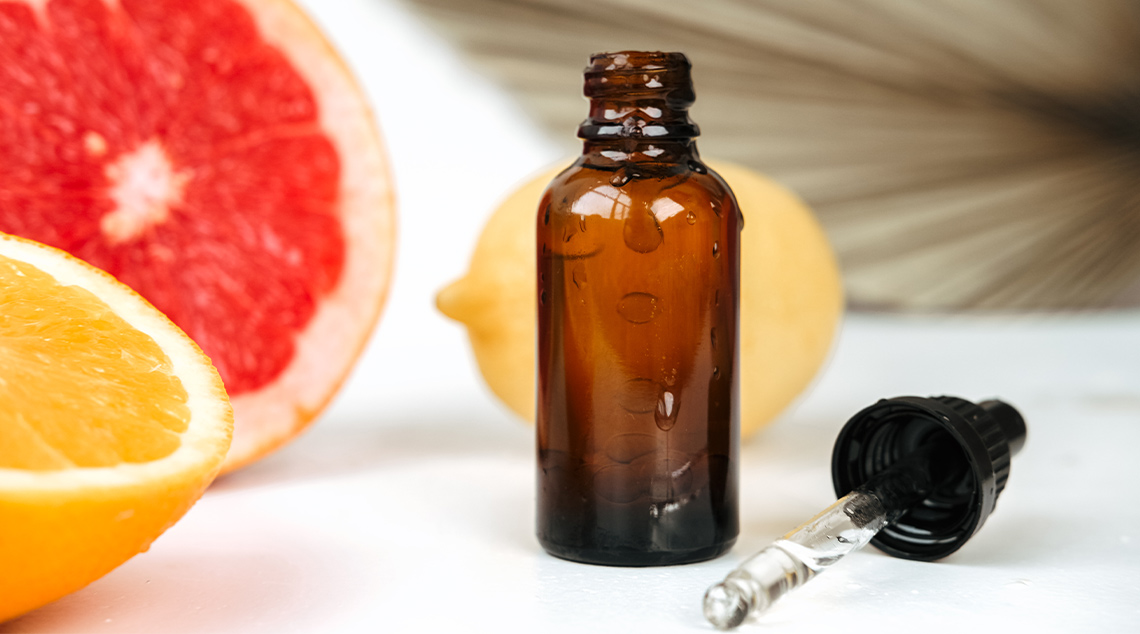Why vitamin C serum is the skincare wonder you’ll want to try
Vitamin C is a sought-after skincare ingredient, but does it really work? And, if it does, what should you look for in a vitamin C serum?
A couple of years ago, one of the most Googled beauty questions was “What does vitamin C do for your skin?”.
Today, vitamin C serums, among others, are a staple in skincare routines.
If you haven’t jumped on the bandwagon yet, read on to discover just what this must-have ingredient does for the skin, what to look for in a vitamin C serum, and how best to use it.
What does vitamin C do for the skin?
The results of a 2023 review study show that vitamin C is effective in treating signs of photo-ageing, including wrinkled skin, loss of elasticity, and pigmentation.
“Vitamin C is a potent antioxidant that helps protect the skin from reactive oxygen species, which is generated from UV light,” Rinascentia Skin Care founder Rina Timpano says.
“Reactive oxygen species damage our cellular DNA and cellular proteins, including the breakdown of collagen.
“Clinical studies have shown that the topical use of vitamin C increases collagen production, helps with pigmentation by decreasing melanin formation and has a potential anti-inflammatory activity.”
Research also shows it can be a useful addition to – but not replacement for – sunscreen.
“Combining sunscreen with vitamin C of 10 per cent concentration or more has been shown to be more effective at neutralising free-radical damage from sun exposure than just using sunscreen alone,” Rina says.
Where does vitamin C serum fit into a skincare routine?
“I recommend applying vitamin C serum in the morning to help provide antioxidant protection against environmental stressors throughout the day, and at night to replenish your skin’s hydration and antioxidant levels,” Rina says.
Skin expert Claudia Fabiani adds that it should be the first product you apply to your skin after cleansing.
“And try to give it a few minutes before placing something on top, be it sunscreen or a night cream, to achieve total stabilisation and better absorption,” Claudia, of Wonder beauty clinic in Sydney, says.
“It’s also worth noting that vitamin C acts on alkaline media and if the skin is previously acidified with (an)other product, neither of them will work.
“Therefore, it’s not advisable to combine vitamin C with retinol, salicylic acid, glycolic acid or AHA.”
What should you look for in a vitamin C serum?
Clinical trials typically study formulations with vitamin C strengths ranging from 10 to 20 per cent, so this is a good guide to bear in mind.
Claudia recommends looking for a vitamin C serum that also contains ferulic acid and vitamin E. “These two ingredients help vitamin C to remain stable and can therefore deliver better results,” Claudia explains.
Rina says while there are a few forms of vitamin C that are used in skin care, if you’re choosing a product with ascorbic or L-ascorbic acid, the packaging is crucial.
“Ascorbic acid in a formula has potential to break down or oxidise when exposed to light and air, making it inactive and potentially damaging for the skin,” Rina explains.
“So, when choosing a product with ascorbic or L-ascorbic acid, look for one in a dark glass bottle, with an airtight dropper to avoid light.”
How to tell if your serum has oxidised?
Claudia has this advice: “Signs of oxidisation include a rusty smell, a yellowish, orange or brown colour, or if the serum has turned into liquid.”
Are vitamin C serums suitable for everyone?
Rina says there are vitamin C products that are suitable for all types of skin and many skin concerns.
For example, if your skin is prone to sensitivity, she suggests using a product that contains an alternative form of vitamin C to ascorbic acid.
“Magnesium ascorbyl phosphate is the most stable form of vitamin C and it’s also one of the most hydrating in its class, effectively soothing skin irritations with its anti-inflammatory properties,” Rina says.
“Therefore, it’s best suited for sensitive skin, as well as teenage or hormonal skin.”
Rina notes there are many products containing vitamin C on the market and finding the one that works for you may be trial and error.
“When using any product, notice what it does for you over time – your skin will let you know if it’s the right product for you,” she says.
More skincare ingredients you’ll want to know about:
- Does your skincare routine need a peptide boost?
- Why retinol is such a game changer in skin care
- Could ectoin be your skin’s best defence against the elements?
- Why polyglutamic acid has the beauty world buzzing
Written by Karen Fittall.




